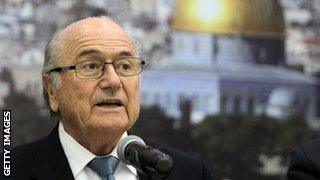Sepp Blatter: Still time for 2022 Qatar World Cup winter switch
- Published
- comments
Can Qatar host a summer World Cup?
Fifa president Sepp Blatter is determined to switch the 2022 World Cup to the winter because of the intense Qatar summer heat.
The head of world football's governing body is planning discussions over the change with his executive committee.
The Premier League are opposed to the move as it would cause major disruption to league fixtures.
Blatter said: "The executive committee will certainly follow my proposal. Then we will have dealt with it for good."
Blatter will hold talks with Fifa's executive committee in October after medical evidence highlighted the dangers of playing games in temperatures that average 40C in June and can reach 50C.
The heat dips to an average of 20C during the winter months.
The host nation is planning to play games in air-conditioned stadiums, but Blatter said: "The Fifa World Cup must be a festival of the people, but, for it to be such a festival, you can't play football in the summer.
"You can cool down the stadiums, but you can't cool down the whole country and you can't simply cool down the ambience of a World Cup.
"The players must be able to play in the best conditions to play a good World Cup."
Moving the World Cup to the winter would significantly impact on the European leagues.
Blatter insists it would only affect one season, but the Premier League fear fixtures could be disrupted across Europe for three seasons.
"The Premier League's view remains unchanged," a spokesman said. "We are opposed to the concept of a winter World Cup for very obvious practical reasons that would impact on all of European domestic football."
The Football Association are also believed to be concerned about the impact a winter World Cup would have on domestic leagues.
But Mark Perryman, of the London England Supporters group, told the BBC his personal view was that a change to the timing of the World Cup should be welcomed.
He said: "It is high time we recognise that football is a world game.
"Half the world in the southern hemisphere are effectively forced to play the World Cup in the middle of their season, so why is there so much upset in European nations when they are expected to do the same?
"A lot of the Nordic and East European countries do not play in the winter because of the weather so this would not affect their own leagues.

Sepp Blatter believes there is still time to switch the 2022 World Cup to winter
"So this is a rather Anglo-centric view that is being taken. There is a long time to go until the tournament, so why can't we reorganise our season to allow a winter World Cup?"
Uefa president Michel Platini has previously stated he is willing to move European club competitions to enable the tournament to be held in winter, insisting it would "not be a problem".
The head of Qatar's organising committee, Hassan Al-Thawadi, says his country is also willing to change their plans.
"If it's a wish of the football community to have the World Cup in winter, then we are open to that," he said.
Qatar defeated bids from South Korea, Japan, Australia and the United States to win a ballot of Fifa's 22 executive members for the right to host the 2022 World Cup.
In February 2011, Blatter was asked about the potential for switching the tournament to the winter and responded that "everything is settled for summer"., external
But his change of heart follows the release of fresh medical information about the effects of heat on players.
"We have to take into account the health, not of the spectators, but of the players," he told Sky Germany., external
Meanwhile, Blatter said Brazil might be the wrong choice to host the 2014 World Cup if the tournament is affected by the wave of protests seen at the Confederations Cup last month.
Hundreds of thousands of Brazilians took to the streets to express their anger over the costs of staging the World Cup and demanding better public services.
"If this happens again, we have to question whether we made the wrong decision awarding the hosting rights," Blatter said. "The government is now aware that next year the World Cup shouldn't be disturbed."
He added: "It's not we who have to learn lessons from the protests in Brazil - politics in Brazil have to do that."
- Published16 May 2013
- Published2 March 2013
- Published2 December 2011
- Attribution
- Published7 October 2011